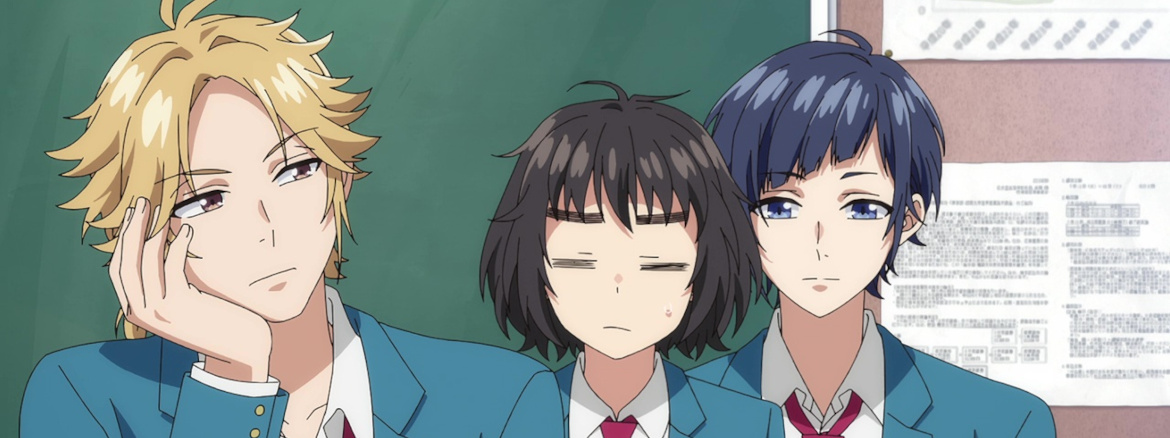
“Hmm? Does ‘manager’ mean… me?”
If I were to list the shows I most looked forward to watching each week of this past season, Heroines Run the Show would definitely make the cut. It may not top the list, but with a strong cast and interesting dynamics, it certainly had me eager to return to it. There is a delicate balance though, which may wear on some viewers’ patience depending on their tastes. The show blends multiple different genres from slice-of-life to comedy to idols, and while this means the series can appeal to a broad number of audiences, it also means that some viewers may feel put off by the shifting focus. I, for example, have limited interest in idols or J-pop, so those aspects of the show often led me to emotionally check out when they moved to the forefront. It’s true with any genre that one’s mileage may vary, but when disparate genres are blended with one another this can serve as either a stumbling block or a catalyst for interesting storytelling. In this scenario both are true. Heroines Run the Show is one of the strongest shows of this past season, and it gets a firm recommendation for me, even if one’s investment may shift from scene to scene.

Heroines Run the Show handily takes the award for “Best Drama” of the season, but the competition was admittedly a little shallow, though that’s not a strike against Heroines itself. The show follows Suzumi Hiyori, a student who has transferred to a high school in Tokyo so she may participate in competitive track and field. To help pay for her housing, she applies for a position that, to her astonishment, involves helping manage the idol careers of two of her classmates. This is complicated by Hiyori’s complete apathy to idols and the tumultuous relationship she shares with the pair. On paper, it feels contrived, but the show does an impressive job of selling the premise, and one of the biggest strengths of the show is the dynamic between Hiyori and the two idols, Someya Yujiro and Shibasaki Aizo. They’re dicks, both to each other and to Hiyori, and the show isn’t quick to forget that fact. The transitions in their relationships are subtle, and watching them shift from rude jabs to light-hearted teasing provides for a surprisingly compelling journey, particularly when they use their ill-mannered talents for good. Hiyori’s classmates help fill out the cast, though some feel underdeveloped, particularly those in the track club. On the whole, the track elements feel a bit like an afterthought in the show, because while it is a key focus for Hiyori, it takes up very little screen time. Hiyori does remain the primary character though, and while her passion for track may take a backseat, her drive to accomplish anything she sets her mind to remains a central component as she tries to balance the various factors in her life. In some ways, your appreciation for the show might be best measured by how much you engage in Hiyori’s struggles.

When I say that I’m not a fan of the idol aspects of the show, I’m actually referring to a rather narrow scope of content. I’m not a fan of when the show chooses to focus on the idol performances themselves or the times when characters proselytize about how great or important idols are. In contrast, I found the business and management components captivating and I was eager to follow the various players involved in organizing events and photo shoots. The show occasionally touches upon some deeper themes regarding the idol industry, but will generally favor not diving into them too deeply. More often than not, the ultimate conclusion the show draws is simply, “Idols are awesome,” and leaves it at that. That’s not to say there aren’t more complex themes that get evoked, but whenever the subject shifts to idols the tone shifts from pleasantly sweet to outright saccharine in an instant. That may sound negative, but as was stated before, those scenes constitute a fraction of the experience, and viewers who are more appreciative of idol media may find it compelling.

The production was helmed by Lay-duce, and when I wrote my First Impressions review, I remember being confused by their output this season as both Heroines Run the Show and Fanfare of Adolescence featured stories that prominently incorporated idols into their plot, but the difference in animation quality was pronounced. I can’t speak for the latter, but I’m pleased to say that Heroines Run the Show maintained the crisp animation quality throughout. I don’t feel equipped to judge the quality of the show’s music though. The OP and ED’s are pleasant enough, but after a few minutes, I legitimately can’t bring to mind how the music actually goes. I only remember the visuals, so I’d characterize the music as pleasant but forgettable.
Before I wrap up, a few Notes and Nitpicks:
- My exposure to idol anime is largely restricted to a viewing of the first season of Love Live! back in 2013. I’m not opposed to giving the idol genre a chance, but it’s rare for the premise for one of those series to click with me. So, don’t expect me to go diving into the new season of Love Live! that’s coming out next week.
- I expressed concerns that Hiyori might get on my nerves after a while, but the show does a good job of preventing her from crossing that line. As a seiyu Minase Inori can be a lot when she goes all out, and I’m glad they didn’t lean on her Hestia-style screaming too heavily.
- The last episode has a rapid fire montage of events that happen in the aftermath of the series. It felt a bit odd, because while there were a number of story threads left dangling, this wasn’t exactly a satisfying method of capping them off. Although it isn’t nearly as bad as this comparison may suggest, it reminded me of the weird, “This is what another season would look like had we cared enough to make it,” ending that The Promised Neverland had.
- The full title is actually Heroines Run the Show: The Unpopular Girl and the Secret Task. That’s a pretty ‘light novel’-title for a show that’s based off of the lyrics of a song. I feel the basic title actually works better and is more to the point.




Add comment